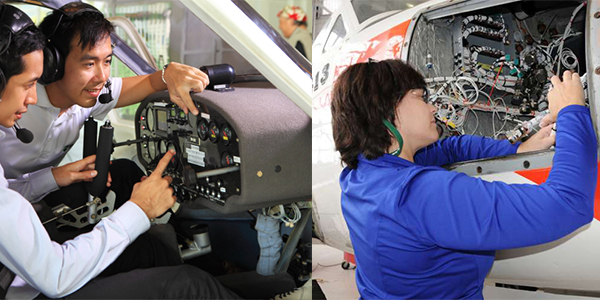Avionics Engineering – is very closely associated with the aerospace or aeronautics industry. The tasks given to avionics engineering is related to the design & programming of the electrical systems on board spacecraft, aircraft & satellites. This field deals with provide important computer system support for all important systems for any aircraft to function, some of the systems are – communication, navigation & guidance systems. The second half of the engineering deals with the testing & repairing process where various tests are performed to ensuring the proper functioning of the above mentioned systems.
Also check : Aerospace Engineering
Avionics Engineering Eligibility:
To appear in any of the entrance examination of undergraduate engineering courses, it becomes compulsory that the student must have passed the higher secondary school certificate examinations with the subjects specialized in Physics, Chemistry & Maths. However some courses demand the need of Biology also which may or may not be considered. The percentage requirements are conditional and they vary according to the university or college sometimes even depending on the state which you apply.
Duration:
Generally, any Bachelor of Engineering in India will span a duration of 4 full academic years which will include 8 semesters i.e; 2 semesters each year at the end of which an university theory cum practical examination for the respective subjects will be conducted. At the end of the final year a final project becomes compulsory, internships and mini projects which are to be done by the student vary from one university to the other. As far as the studying of subjects are concerned, it depends on the syllabus of each university that how much main subjects it allots per semester but a minimum of five subjects is expected to be written as theory examination conducted at the end of every semester.
Admission Process:
Option 1:
Merit seats- admission through Common Entrance Test conducted by respective state examination board/ college / university.
Option 2 :
Payment seats offered by the respective Colleges/Universities.
The above are the options through which an engineering admission could be done, you will have to select the most appropriate college/university in which you want to get into and then obtain the college details, relevant contact phone number and visit the institution for further enquiries.
Fees:
Each university has its own fees structure though, we would like to present to you a generalized scenario. Private universities will cost you around 150,000 to 300,000 (1.5 to 3 lakh) rupees per student per year . Public university on an average will cost between 75,000 to 150,000 rupees per student per year. Living expenses will cost you depending on the location of the university like in cities, it will cost you more and your style of living. Generally, this expenditure may cost you around Rs.1 lac excluding your tuition fees.
Also check : Career in Computer Science Engineering
Syllabus & Subjects Studied:
- Computing (Fundamentals, Programming, Design).
- Circuits & Power Electronics.
- Digital & Embedded Systems.
- Electromagnetic, Microwave & Antenna.
- Communications.
- Guidance, Navigation & Controls.
- Radars & Avionics Systems.
- Inter-disciplinary electives.
Best Colleges/Universities:
- Hindustan Institute Of Technology & Science.
- Indian Institute Of Space Science & Technology.
- Madras Institute Of Technology.
- PSN College of Engineering.
- University of Petroleum & Energy Studies.
Jobs after completing this course:
Sector / Industry.
There are currently many jobs available mostly with the government sector especially in India. Most aeronautical engineers fit into organizations such as National Aerospace Laboratories (NAL) , ISRO (Indian Space Research Organization), DRDO (Defence Research & Development Organization and of course HAL (Hindustan Aeronautics Limited). There are a lot of jobs available in the aviation sector also, but people side with the rumours and assume there to be no jobs after completing the aeronautics course.
Engineers who are interested in settling down abroad may also apply for jobs in countries like the United States of America, Germany, France, UK and the UAE. There are a good number of Indian engineers working at some of the world best places like NASA, R&D of various military forces abroad, even in very big aeronautical organisations like FAA(Federal Aviation Administration) & ICAO(International Civil Aviation Organisation).
Salary.
The salary for an Avionics Engineering in India especially in the public sectors is based on a n graded official scale. In the privatized sectors the management of the company decides if The approximate starting salaries in the government /public sectors such as HAL, NAL are Rs. 8,000 to Rs. 10,000 (excluding other allowances). In the private sector, the scales are approximately around Rs. 8,000 to Rs.15,000 per month.
Careers after completing Avionics Engineering:
- Junior Engineers.
- Trainees.
- Consultants.
- Assistant Aircraft Engineers.
- Assistant Technical Officers.
- Aircraft Production Manager.
- Aerospace Designer Checker.
Courses after completing this course:
Masters Degree is possible in the following specializations:
- Aeronautical Engineering.
- Aircraft Maintenance Engineering.
- Space Engineering & Rocketry.
- Aerospace Engineering.
- Aircraft Design.
- Aeronautical Engineering.
Research options are also available for Avionics Engineering.





